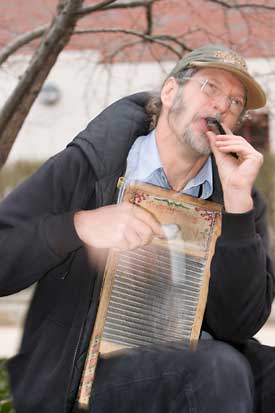Thomas Goss is a senior research lab specialist at the University, but for the hundreds of people who walk across the heart of campus every day, he is the man emanating show tunes, television theme music and other popular songs from his harmonica.

Goss has been conducting molecular and cell developmental biology research under a National Institutes of Health grant for the past 17 years. Playing music in a shaded spot on the Diag, usually across from the Undergraduate Library, is just a way for him to decompress after a long day of work in the lab.
“It’s good stress management and a way to socialize,” he says. “Although surprisingly few people stop to chat. I think they don’t want to interrupt me.”
Goss believes his music not only calms his own spirit, but also is soothing for passers-by.
“Some people who appreciate what I do say my music does help them cope with the stress of college,” he says. “There is more to life than tests and deadlines, and my music reaffirms this notion to them. I feel my music is corrupting their minds in a positive and de-stressing manner.”
Goss has been jamming on his harmonica, spoons and washboard in various spots near or on the Diag for the past seven years. He has a repertoire of 300 songs, many of which he re-creates into his own arrangements of well-known songs.
Of his musical passion, Goss says, “I play music because I love creating things, such as sound with elements of rhythm, melody and harmony that, at least to me, seem pleasing.”
Playing on the Diag started when Goss realized something was missing from his life.
“I first went out there because there was just something lacking,” he says. “I mean, I work all day, and then just go home with all these problems in my mind. I wanted to meet other musicians, which wasn’t happening when I went home.”
A self-proclaimed exhibitionist, Goss performs publicly because, as he says, “In public places you are able to people-watch, socialize and meet people, as well as have some degree of exposure to the wonderfully tolerant people of Ann Arbor, which is not attainable when playing in your basement or garage. Gifts should be used and shared, not squandered and hidden away.”
Goss picked up the harmonica in high school. The spoons and washboard came to be part of his musical ability in college, which he attended at the University of Illinois at Urbana-Champaign. He came to Michigan to earn his doctoral degree in biochemistry, and has not stopped working or playing since.
Goss begins his days at 6:30 a.m., when he straps on laboratory goggles to do basic research on the genetics and physiology of a bacterium closely related to Escherichia coli, Klebsiella pneumoniae. At 3:30 p.m., rain or shine, he gathers up his instruments and heads for the Diag. He tries to play through the winter as long as it’s reasonably mild outside.
Sometimes, when the weather is warm, other musicians join Goss spontaneously to play music together. Aside from the smiles, occasional poems or drawings, positive gestures, appreciative e-mails and a few verbal expressions, Goss’ favorite parts of performing on the Diag are these musical collaborations that develop into jam sessions with other musicians.
Word got around a couple of years ago that Goss was a professor, which changed many peoples’ perspective on him.
“I guess a few years ago, no one would have ever questioned what I was doing out there. But now people are interrupting my playing to ask me if I’m a professor. I’m flattered by it, but I’m just a random person out there having fun playing music,” he says.
Goss has a daughter who is a freshman at Kalamazoo College and a son in high school.
“I think they kind of like the fact that I do this,” he says. “They get to have the dad who is the harmonica guy.”
However, the harmonica does not define Goss.
“It’s a part of me,” he admits, “but a part which I like to keep separate from, say, the scientist, parent or other aspects of my life.’

